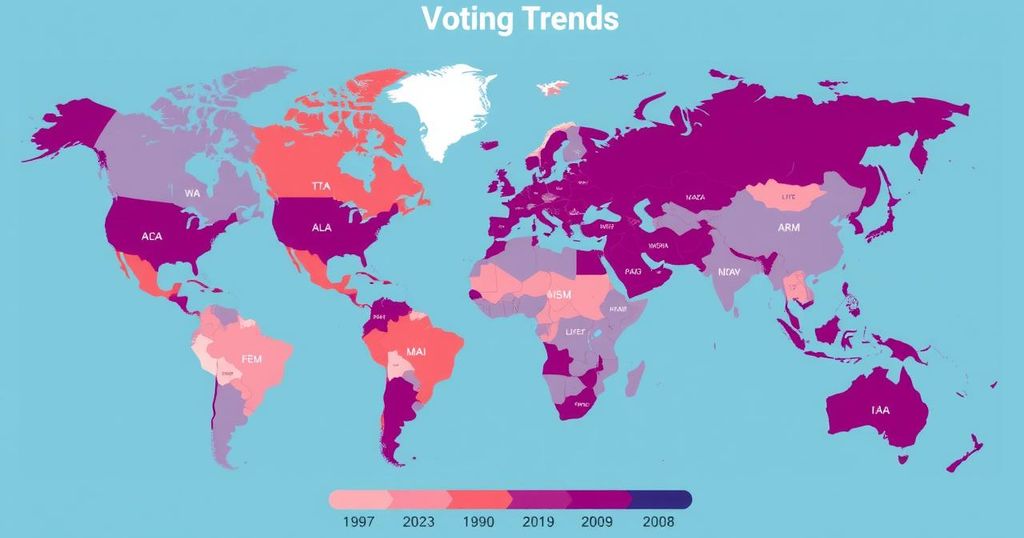Global Electoral Trends: How the World Voted in 2024
In 2024, over 70 countries held elections, with significant participation from 1.7 billion voters. The global average voter turnout was 61%, with Rwanda leading at 98.2%. Key results included Narendra Modi’s BJP losing its majority in India, Donald Trump returning to the presidency in the U.S., and several countries witnessing new leadership. The elections highlighted a mixture of continuity and change in political landscapes across the globe.
In the year 2024, over 70 countries participated in elections, leading to more than 1.7 billion people casting their votes globally. The elections included individual national elections as well as the European Parliament elections, affecting approximately half of the world’s population. Among the five most populous countries that voted were India, the United States, Indonesia, Pakistan, and Bangladesh, representing significant electoral power and influence.
The voter turnout varied significantly; the global average reached 61%, with Rwanda exhibiting the highest at 98.2%, and Tunisia the lowest at a mere 28.8%. Elections in multiple countries resulted in the re-election of incumbents such as Narendra Modi in India and Vladimir Putin in Russia, although both faced reduced parliamentary numbers compared to previous terms. Remarkably, emerging leaders and coalition governments were formed in several nations, reflecting shifting political dynamics.
India led the elections with 637.4 million voters participating in a multifaceted electoral process that highlighted a surprising turn for Prime Minister Modi’s party, which fell short of a majority. In Indonesia, Defense Minister Prabowo Subianto secured 59% of votes amidst allegations of previous human rights abuses. The United States witnessed a highly contentious election in which Donald Trump returned to office after defeating Kamala Harris in an environment marked by political polarization.
The election landscape also saw new leaders, such as Claudia Sheinbaum in Mexico, and international repercussions from results in regions like Iran and Syria, where political shifts were marred by past controversies and civil unrest. Ultimately, the 2024 elections illustrated unprecedented electoral trends and patterns across the globe.
The year 2024 marked a significant global electoral period, with over 70 countries participating in various elections, highlighting distinct political inclinations and governance outcomes worldwide. The European Union parliamentary elections were notably influential, complementing the individual national elections. This electoral cycle reflected ongoing trends, with democracies facing challenges such as reduced voter turnouts, political polarization, and growing demands for accountability and reform against the backdrop of historical leadership dynamics and socio-economic issues that shaped public sentiment.
The 2024 elections worldwide demonstrated dynamic political shifts and changes in leadership, revealing both the complexities of maintaining power and the necessity for adaptability in governance amidst public scrutiny and unrest. While incumbents like Vladimir Putin and Narendra Modi retained their positions, they did so amid reduced majorities. Conversely, new leaders emerged in dramatic transitions, including a notable case in Botswana where an opposition victory ended decades of rule. These elections not only shaped the immediate political landscape but also set a precedent for future shifts in global governance.
Original Source: www.aljazeera.com




Post Comment